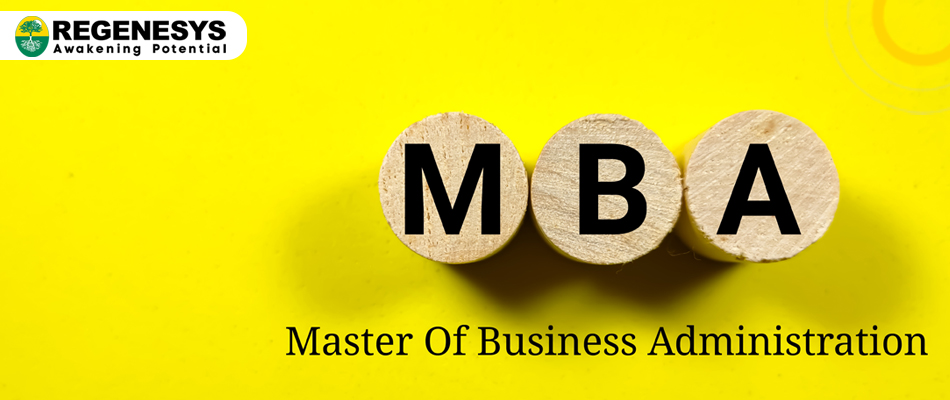Can you obtain a Master of Business Administration (MBA) without the traditional stepping stone of a bachelor’s degree? While the standard path involves completing an undergraduate education before pursuing an MBA, exceptions and alternative routes exist.
In this article, let us explore the possibilities for individuals who may still need a bachelor’s degree but aspire to earn the prestigious MBA qualification. From considerations about professional experience to the details of executive MBA programmes and alternative qualifications, we’ll navigate the landscape to provide insights into the feasibility of pursuing an MBA without a traditional degree.
Table of Contents
What is an MBA Degree?
An MBA degree, which stands for Master of Business Administration, is a post-graduate-level academic qualification that provides individuals with advanced knowledge and skills in business and management.
MBA programmes are designed to prepare students for leadership roles in various sectors of the business world, equipping them with a broad understanding of business concepts and the ability to apply strategic thinking to complex issues.
MBA programmes vary in duration, structure, and focus, and admission is typically competitive. Prospective students often need a bachelor’s degree and relevant work experience. They may be required to submit standardised test scores (such as the GMAT or GRE), letters of recommendation, and a statement of purpose as part of the application process.
Also Read: Decoding MBA: Unveiling the Meaning and Impact.
Benefits of an MBA Degree
Earning a Master of Business Administration (MBA) degree can offer a range of benefits, personally and professionally. Here are some key advantages associated with obtaining an MBA degree:
Enhanced Business Knowledge:
- MBA programmes comprehensively understand various business disciplines, including finance, marketing, operations, human resources, strategy, and entrepreneurship.
- This well-rounded knowledge prepares individuals for leadership roles where a broad business perspective is essential.
Leadership Development:
- MBA programmes focus on developing leadership skills, including strategic thinking, decision-making, communication, and team management.
- Graduates are equipped to lead teams and organisations effectively.
Networking Opportunities:
- MBA programmes provide extensive networking opportunities.
- Students interact with peers, alumni, faculty, and industry professionals, building a valuable network to facilitate career advancement and business connections.
Career Advancement:
- An MBA is often a catalyst for career advancement.
- Graduates are well-positioned for higher-level management roles, executive positions, and leadership opportunities within their chosen industries.
Specialisations and Expertise:
- Many MBA programmes offer specialisations or concentrations, allowing individuals to develop expertise in finance, marketing, healthcare management, or entrepreneurship.
- This specialisation enhances career prospects in niche industries.
Entrepreneurial Skills:
- MBA programmes often cultivate entrepreneurial skills, preparing individuals to start and manage their businesses.
- This includes understanding business planning, innovation, and risk management.
Global Perspective:
- MBA programmes often incorporate a global perspective, addressing challenges and opportunities in the international business environment.
- This global mindset is valuable in an increasingly interconnected world.
Critical Thinking and Problem-Solving:
- MBA education emphasises critical thinking and analytical skills.
- Graduates are trained to analyse complex business problems, make informed decisions, and contribute to strategic planning.
Increased Earning Potential:
- On average, individuals with an MBA tend to have higher earning potential than those with only a bachelor’s degree.
- The financial investment in an MBA often yields returns over a career.
Job Security:
- The skills and knowledge gained through an MBA make individuals more adaptable to changes in the business environment.
- This adaptability enhances job security and makes MBA graduates valuable assets to organisations.
Opportunities for Career Switching:
- An MBA provides flexibility for individuals looking to switch careers or industries.
- The broad skill set acquired allows graduates to transition into different roles and sectors.
Access to Alumni Networks:
- MBA programmes often have strong alumni networks that provide ongoing support, mentorship, and career guidance.
- Access to this network can be valuable throughout one’s professional life.
It’s important to note that the benefits of an MBA programme can vary based on factors such as the reputation of the business school, the individual’s career goals, and the specific industry or job market. Prospective students should consider their personal and professional objectives when pursuing an MBA.
Also Read: What Is The Use Of A Master Of Business Administration?
Can I Get An MBA Without A Degree?
In most cases, obtaining an MBA (Master of Business Administration) without a prior bachelor’s degree is uncommon and challenging. The traditional admission requirements for MBA programmes typically include a completed undergraduate degree from a recognised institution. This requirement is in place to ensure that students enroling in an MBA programme have a foundational understanding of business concepts and are adequately prepared for the advanced coursework.
However, there are a few exceptions or alternative pathways that may allow individuals without a bachelor’s degree to pursue an MBA:
Extensive Professional Experience:
- Some MBA programmes consider applicants with significant and relevant professional experience instead of a bachelor’s degree.
- The exact requirements vary by institution, but this pathway is generally designed for mid to senior-level professionals who have demonstrated leadership and business acumen over an extended period.
Executive MBA (EMBA) Programmes:
- Executive MBA programmes are designed for mid-career professionals and executives.
- While they typically require a bachelor’s degree, some EMBA programmes may consider candidates with substantial professional experience and accomplishments, even if they lack a traditional undergraduate degree.
Alternative Qualifications:
- In some cases, candidates with alternative qualifications, such as professional certifications or significant achievements in their field, may be considered for admission.
- This, however, is less common and varies by institution.
- Thus, it is crucial to note that these exceptions are not universal, and eligibility criteria vary among MBA programmes and institutions.
- Additionally, even if exceptions are made, candidates without a bachelor’s degree may face a more rigorous evaluation process to assess their readiness for the programmes.
Before considering pursuing an MBA without a degree, individuals should research specific programme requirements, contact admissions offices for clarification, and carefully review admission policies to determine if they meet the institution’s criteria.
Remember that most MBA programmes adhere to traditional academic prerequisites, and candidates are generally expected to hold a bachelor’s degree for admission.
Conclusion
Embarking on an MBA journey without a degree requires careful consideration, awareness of programme nuances, and a strategic approach to meet admission criteria.
Join us as we unravel the possibilities for those who aspire to pursue an MBA, even if their educational journey has taken a non-traditional path.
Stay tuned with Regenesys Business School to explore the Regenesys MBA programme and its features.
Can I Get An MBA Without A Degree? – FAQ’s
Is an MBA programme a career advancement?
An MBA is often pursued to enhance career prospects and accelerate professional growth. The MBA degree paves the way for higher-level management and executive positions.
What skills are gained by pursuing an MBA degree?
An MBA programme provides a well-rounded education in various business disciplines, helping students develop essential skills like leadership, critical thinking, problem-solving, and communication.
What are the different types of an MBA programme?
There are several types of MBA programmes, typically ranging from one to two years of full-time study and structure- full-time, part-time, or online. Thus, the different types of MBA programmes include:
Online MBA
Full-Time MBA
Part-Time MBA
Executive MBA
Specialised MBA
What are the common MBA specialisations?
Some of the common MBA specialisations include:
Finance
Marketing
Human Resources
Entrepreneurship
Operations Management
Information Technology (IT) Management and more.
Why pursue Regenesys’ MBA programme?
Regenesys Business School offers a transformative MBA experience tailored for individuals seeking personal and professional growth. At Regenesys, the MBA programme is designed to equip students with the essential knowledge, skills, and mindset needed to navigate the complexities of the modern business landscape.








2 Comments
I believe one of your advertisings caused my web browser to resize, you might want to put that on your blacklist.
Admiring the dedication you put into your website and in depth information you provide. It’s nice to come across a blog every once in a while that isn’t the same out of date rehashed information. Great read! I’ve saved your site and I’m including your RSS feeds to my Google account.